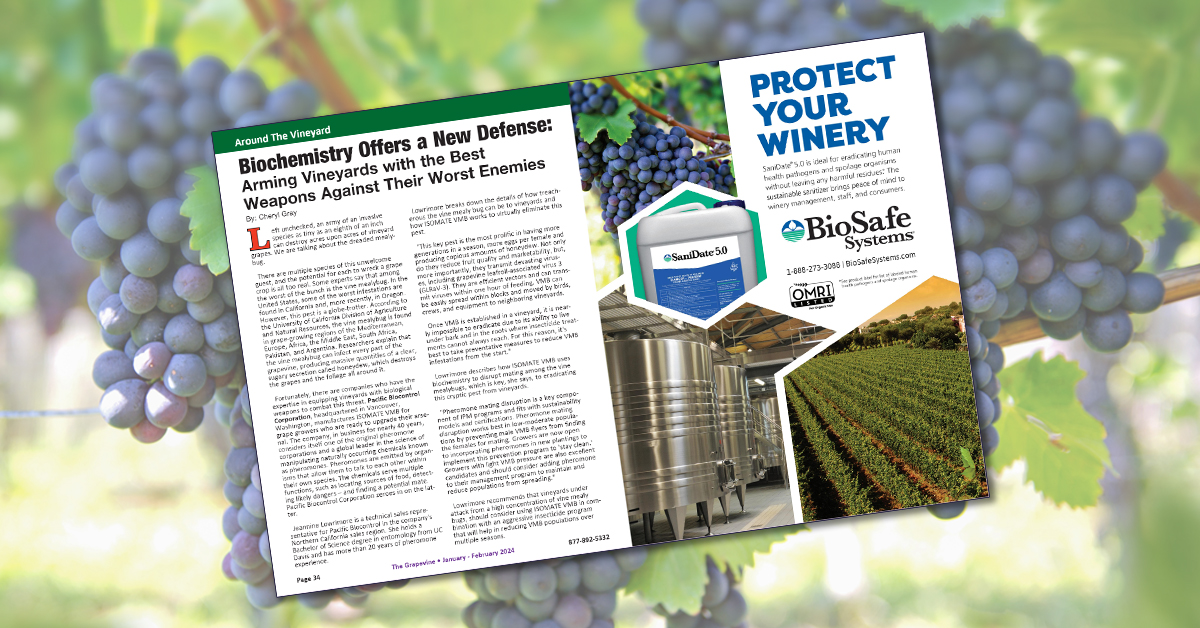Arming Vineyards with the Best Weapons Against Their Worst Enemies
By Cheryl Gray, The Grapevine, January-February 2024
Left unchecked, an army of an invasive species as tiny as an eighth of an inch can destroy acres upon acres of vineyard grapes. We are talking about the dreaded mealybug.
There are multiple species of this unwelcome guest, and the potential for each to wreck a grape crop is all too real. Some experts say that among the worst of the bunch is the vine mealybug. In the United States, some of the worst infestations are found in California and, more recently, in Oregon. However, this pest is a globe-trotter. According to the University of California Division of Agriculture and Natural Resources, the vine mealybug is found in grape-growing regions of the Mediterranean, Europe, Africa, the Middle East, South Africa, Pakistan, and Argentina. Researchers explain that the vine mealybug can infect every part of the grapevine, producing massive quantities of a clear, sugary secretion called honeydew, which destroys the grapes and the foliage all around it.
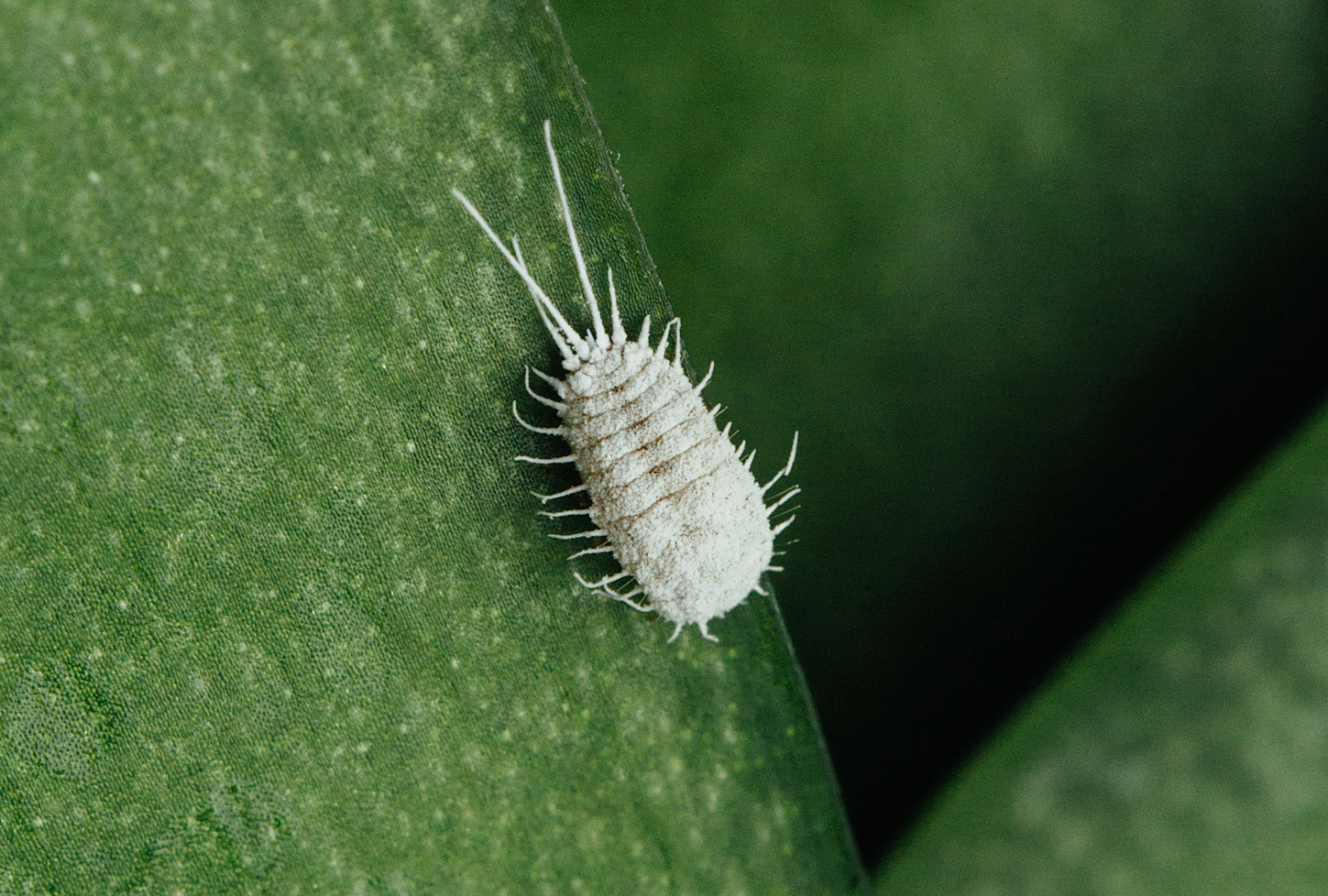
Fortunately, there are companies who have the expertise in equipping vineyards with biological weapons to combat this threat. Pacific Biocontrol Corporation, headquartered in Vancouver, Washington, manufactures ISOMATE VMB for grape growers who are ready to upgrade their arsenal. The company, in business for nearly 40 years, considers itself one of the original pheromone corporations and a global leader in the science of manipulating naturally occurring chemicals known as pheromones. Pheromones are emitted by organisms that allow them to talk to each other within their own species. The chemicals serve multiple functions, such as locating sources of food, detecting likely dangers – and finding a potential mate. Pacific Biocontrol Corporation zeroes in on the latter.
Jeannine Lowrimore is a technical sales representative for Pacific Biocontrol in the company’s Northern California sales region. She holds a Bachelor of Science degree in entomology from UC Davis and has more than 20 years of pheromone experience.
Lowrimore breaks down the details of how treacherous the vine mealy bug can be to vineyards and how ISOMATE VMB works to virtually eliminate this pest.
“This key pest is the most prolific in having more generations in a season, more eggs per female and producing copious amounts of honeydew. Not only do they reduce fruit quality and marketability, but, more importantly, they transmit devasting viruses, including grapevine leafroll-associated virus 3 (GLRaV-3). They are efficient vectors and can transmit viruses within one hour of feeding. VMB can be easily spread within blocks and moved by birds, crews, and equipment to neighboring vineyards.
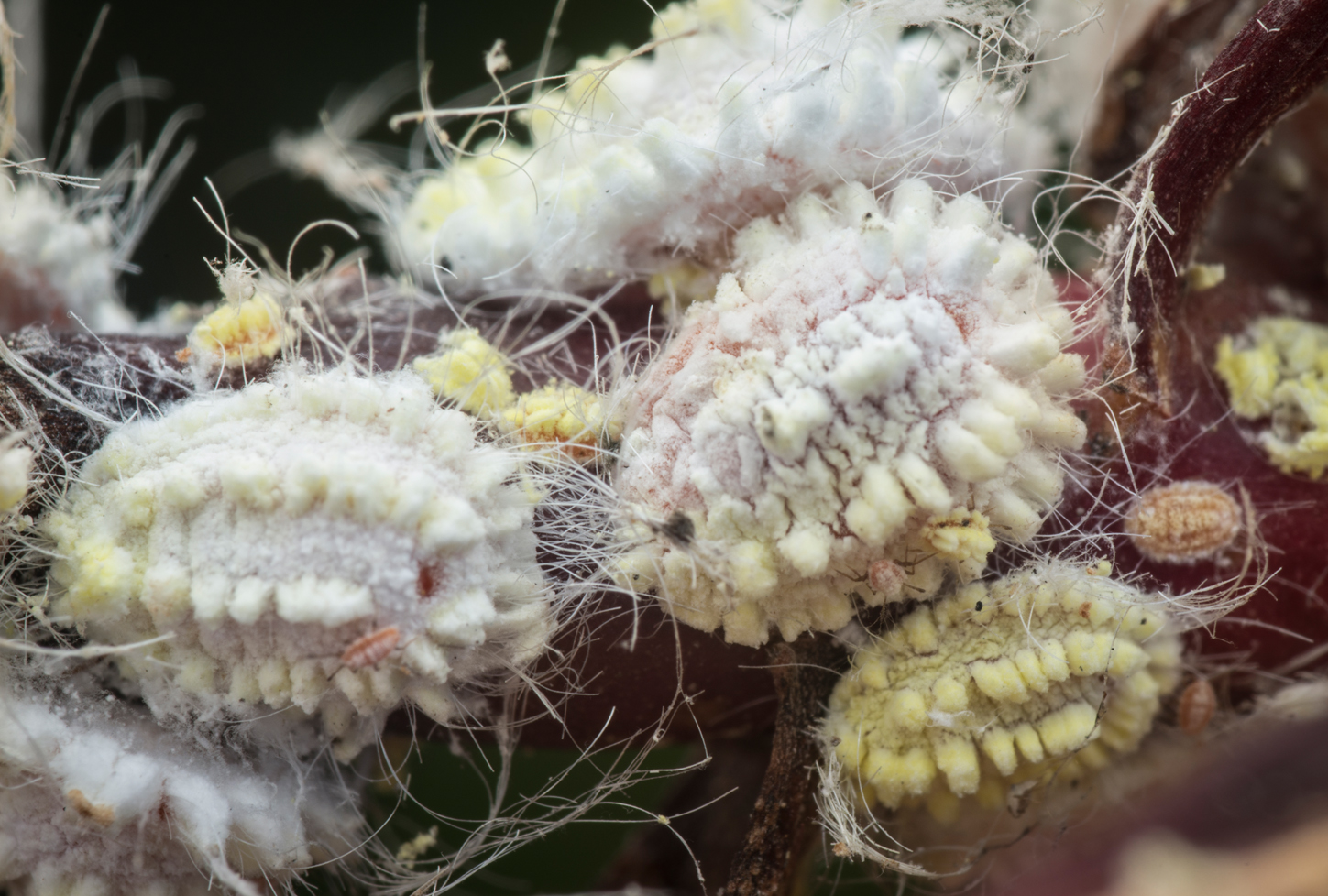
Once VMB is established in a vineyard, it is nearly impossible to eradicate due to its ability to live under bark and in the roots where insecticide treatments cannot always reach. For this reason, it’s best to take preventative measures to reduce VMB infestations from the start.”
Lowrimore describes how ISOMATE VMB uses biochemistry to disrupt mating among the vine mealybugs, which is key, she says, to eradicating this cryptic pest from vineyards.
“Pheromone mating disruption is a key component of IPM programs and fits with sustainability models and certifications. Pheromone mating disruption works best in low-moderate populations by preventing male VMB flyers from finding the females for mating. Growers are now open to incorporating pheromones in new plantings to implement this prevention program to ‘stay clean.’ Growers with light VMB pressure are also excellent candidates and should consider adding pheromone to their management program to maintain and reduce populations from spreading.”
Lowrimore recommends that vineyards under attack from a high concentration of vine mealy bugs, should consider using ISOMATE VMB in combination with an aggressive insecticide program that will help in reducing VMB populations over multiple seasons.
“Pheromones should be considered an additional tool to an insecticide program. ISOMATE VMB dispensers have proven longevity to last 200 plus days in cooler growing regions and fill in the ‘gaps’ between insecticide treatments. Having pheromone coverage into the large and critical fall flight is imperative and this is where ISOMATE VMB has excelled. When growers deploy dispensers in March or April, they can have a ‘set it and forget it’ pheromone program that covers them into November and won’t hinder harvest activities.”
She explains how the product is dispensed throughout the typical vineyard and how it has earned a global reputation for its effectiveness.
“ISOMATE VMB is deployed at a rate of 120 to 200 dispensers per acre depending upon VMB pressure. This variable rate allows growers to economically address VMB populations without compromising on efficacy.
ISOMATE dispensers have been used for numerous pests worldwide for over 30 years. They are known for their consistent release of pheromones and ease of deployment. ISOMATE VMB longevity is supported by trap data, in-season gravimetric weighing and gas chromatography ionization detection (GC-FID). Understanding and monitoring the release rates of the dispenser is imperative in having a reliable product year after year.”
Lowrimore says that the mission of Pacific Biocontrol is to increase the use of its products designed to disrupt the mating of vine mealy bugs by educating grape growers on how a pheromone program can impact production. Lowrimore adds that the company partners with academia, industry, and growers, establishing regional pest management programs where pheromone mating disruption can benefit whole communities.
Clients of Pacific Biocontrol include fruit and nut growers ranging from small operations to large-capacity production farms.
Another company with expertise in deploying biological solutions to combat vineyard pests is BioSafe Systems, a family-owned and operated firm headquartered in East Hartford, Connecticut. The company has worked over 25 years innovating sustainable chemistry designed to supplement conventional methods in fighting vineyard organisms that threaten crops.
BioSafe Systems also considers itself a steward of the environment. Its line of products includes OxiDate® 5.0 and PerCarb®. Both focus on improving wine grape production. The GreenClean® Alkaline Cleaner and SaniDate® 5.0 are used in winery facilities.
BioSafe Systems officials stress that the company conducts perpetual vineyard crop protection research throughout the nation to demonstrate the efficacy of its products. Its vineyard protection brands are formulated to guard and improve soil quality by creating an optimal ground environment in which grape plants can thrive. The company was
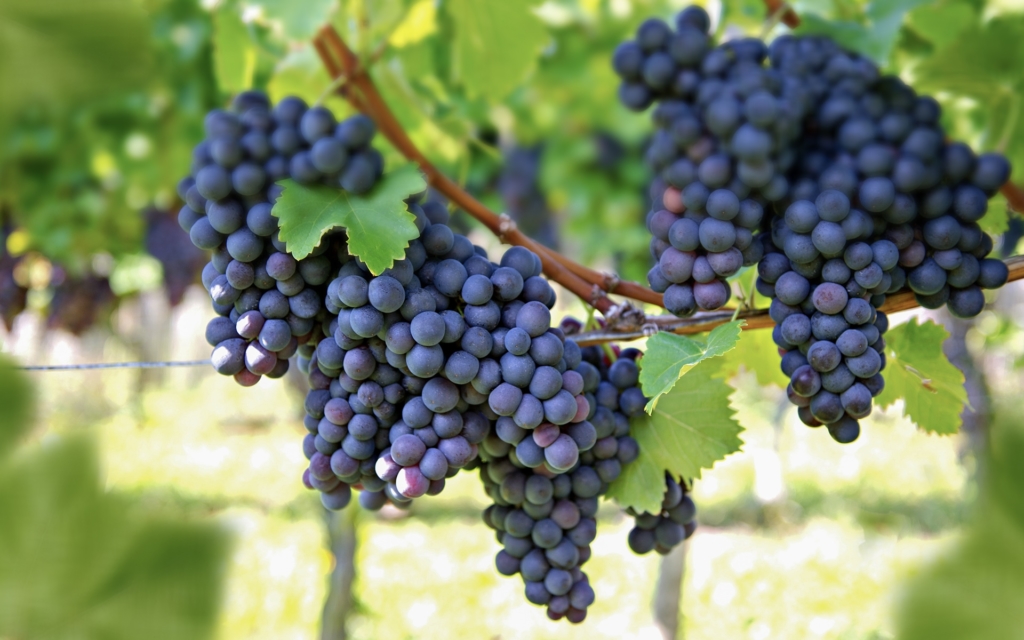
recently awarded U.S. Patent Number 11439151 B2, entitled “Process for Treating an Agricultural Medium.” The patent acknowledges the company’s Restorative Soils Program™ (RSP) as a vital tool for the future of the industry.
Company officials explain that the process begins with a soil treatment of aqueous peroxyacetic acid (PAA) to diminish the levels of soilborne plant pathogenic organisms. The next step is to apply complementary beneficial rhizobacteria and biostimulants to the soil to fortify a diverse soil ecosystem that supports and promotes optimal plant health. The BioSafe Systems’ Restorative Soils Program™ is designed to rebalance and enhance soil’s microbiome to deliver a solid foundation to protect the investment that vineyards in planting grapes.
Sarah Budde Rodriguez, Ph.D., is a field development specialist for BioSafe Systems. Her expertise is in plant pathology. Dr. Rodriguez explains why the Restorative Soils Program™ works to achieve optimal grape production.
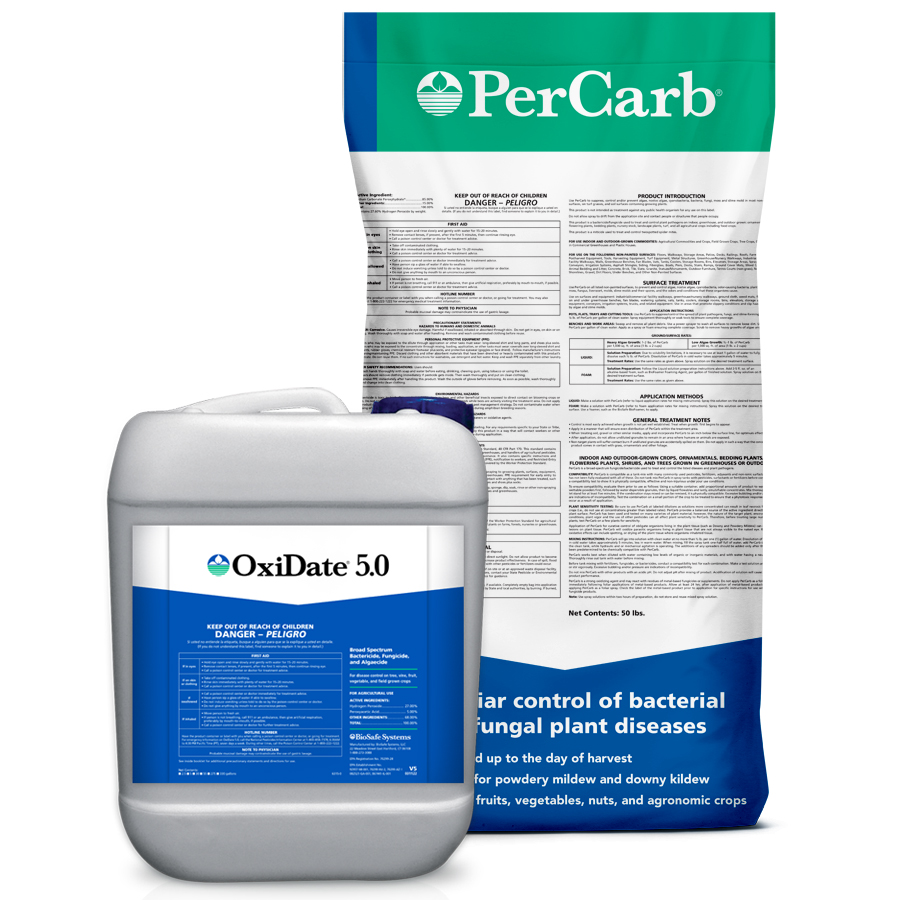
“The Restorative Soils Program™ is the ideal footing to build upon when replanting and establishing new vines. It begins with a soil treatment using TerraStart® HC or OxiDate® 5.0 to diminish soilborne plant pathogenic organisms. Next, an application TerraGrow® Liquid, a blend of beneficial rhizobacteria and biostimulants, is introduced to promote optimal plant health. The process is especially important in the first few seasons following new plantings to support the establishment of healthy new vines, while it can also be repeated during the vines’ lifespan, to bolster the health and quality of the vineyard through the years. The Restorative Soils Program™ (RSP) is the foundation of a comprehensive integrated pest management plan providing the tools needed to fight soilborne pathogens, improve rhizosphere dynamics and reinforce plant health.”
One more company with an organic approach to helping growers is Live Earth Products, Inc., based in Utah. The family-run business mines and manufactures humic acid and fulvic acid-based products. Humate is a mined mineral that experts say is used to help improve nutrient retention and water conservation. Humates are used to reduce fertilizer loss and add organic matter to improve water conservation.
Live Earth Products started as a small operation but now has clients all over the world. Russell Taylor, whose father launched the company shortly after a deadly mining accident in 1984, is the company’s vice president. Taylor was recently awarded the 2023 CCA Conservationist of the Year Award.
“In the late ’80s and ’90s, promoting soil health and fertilizer reduction was not a common item discussed by farmers,” he said. “My father was a visionary far ahead of his time, and I can assure you that selling humate was not extremely profitable at the time. The good news is that we persevered. Our products are now sold internationally.”
Taylor explains that Live Earth Products has three core offerings: Humate Soil Conditioner, Liquid 6 (humic acid) and LM-32 AG (fulvic acid). While all three products are used by conventional growers, they are also OMRI-listed for use in organic agriculture. Liquid 6 is popular among growers because humic acid helps to improve micronutrient availability. LM-32 is a liquid fulvic acid that is naturally pH 3.0 and is used not only in agriculture but also in other industries, such as cosmetics.
The science of biochemistry plays a vital role in fighting on multiple fronts to protect grapes from harm. At the same time, there are companies that also focus on protecting the environment around vineyards and beyond.
